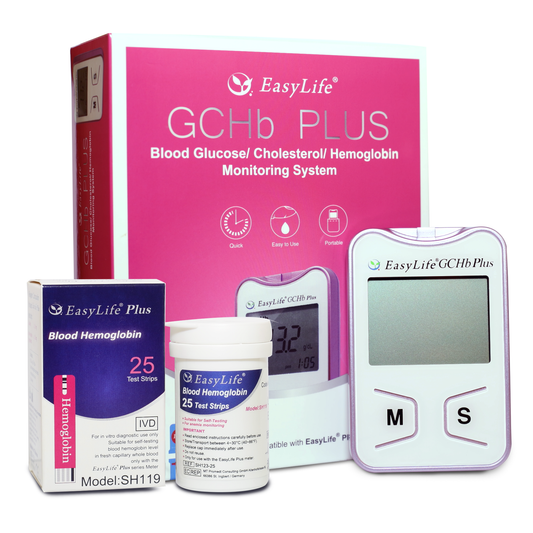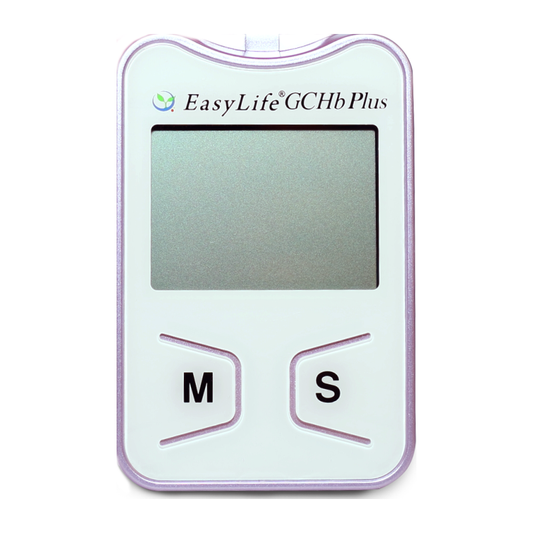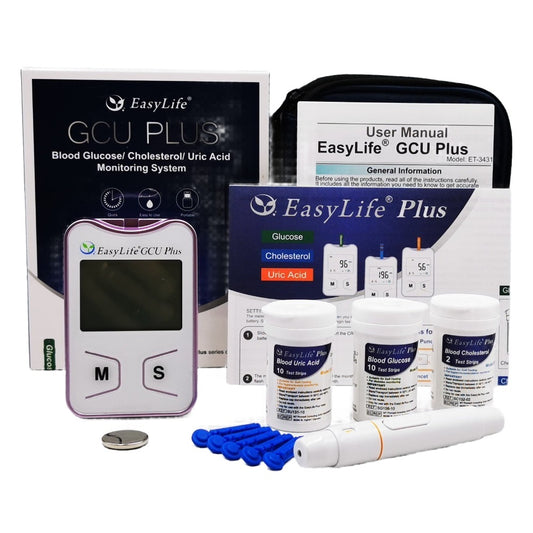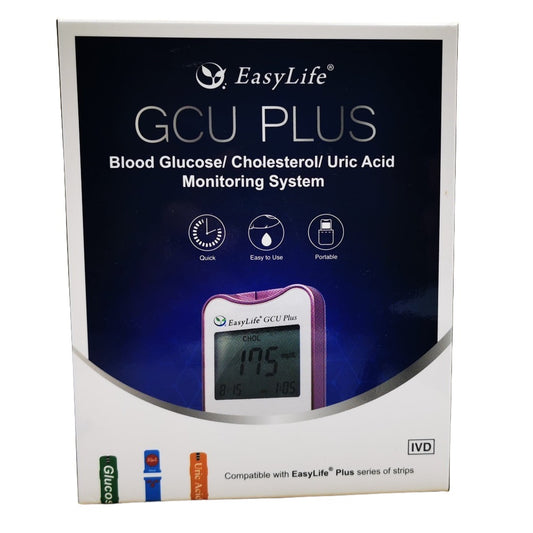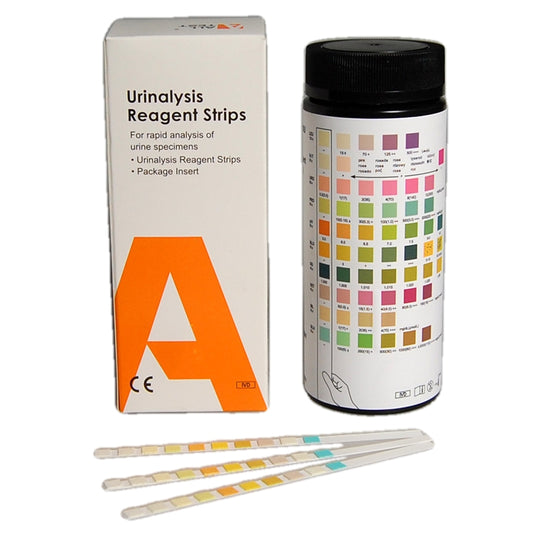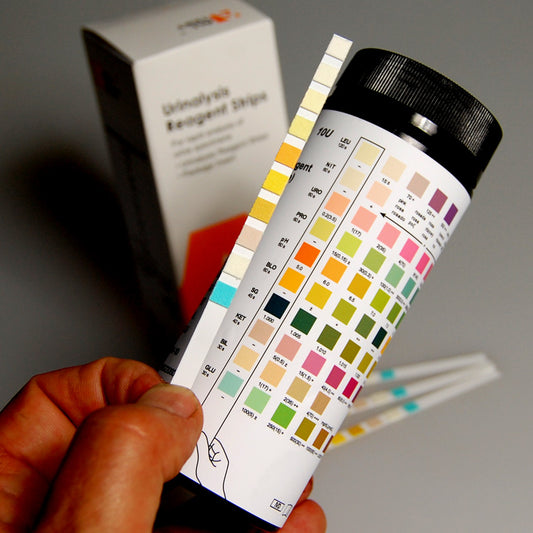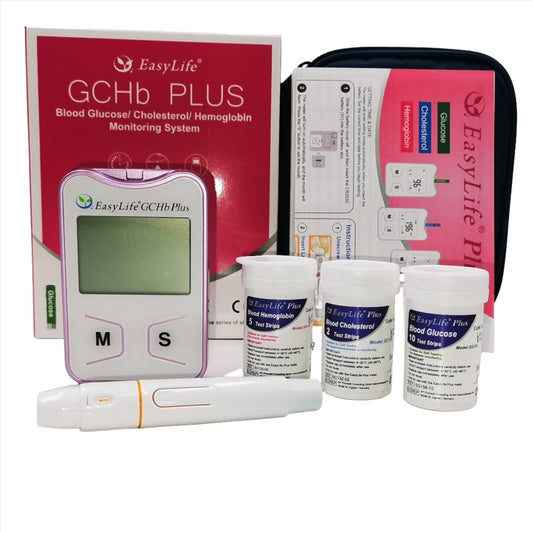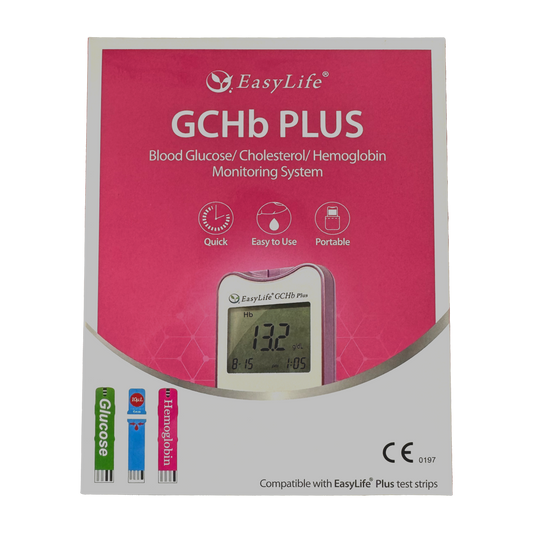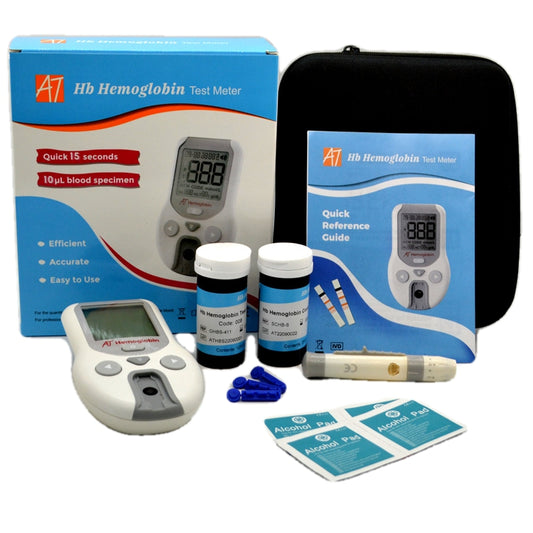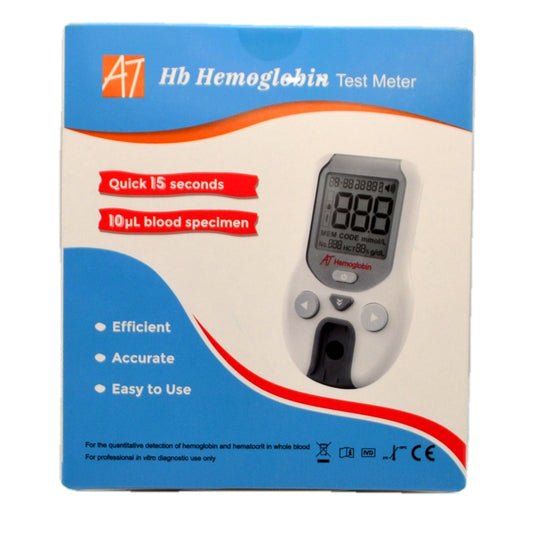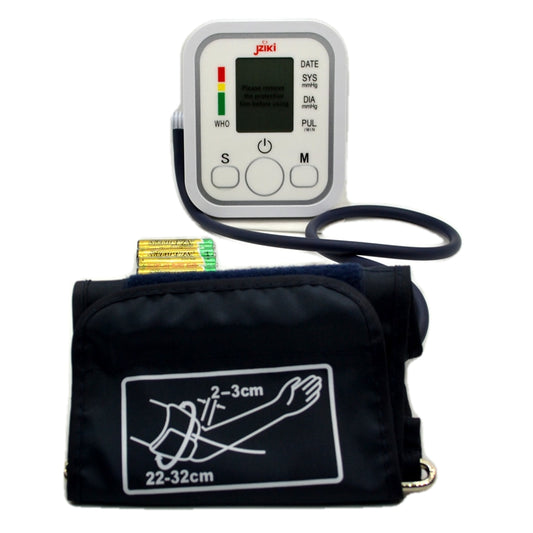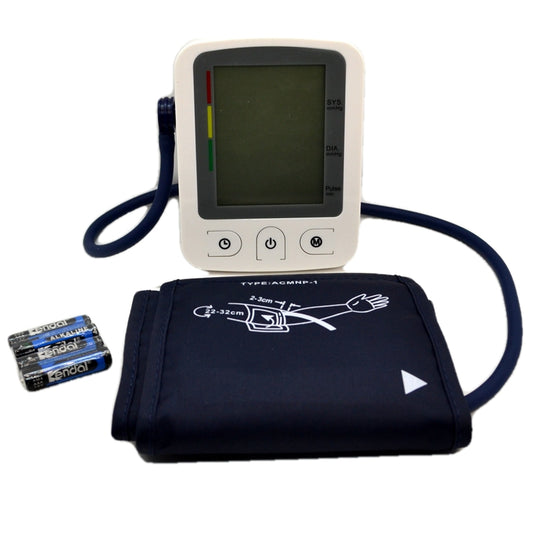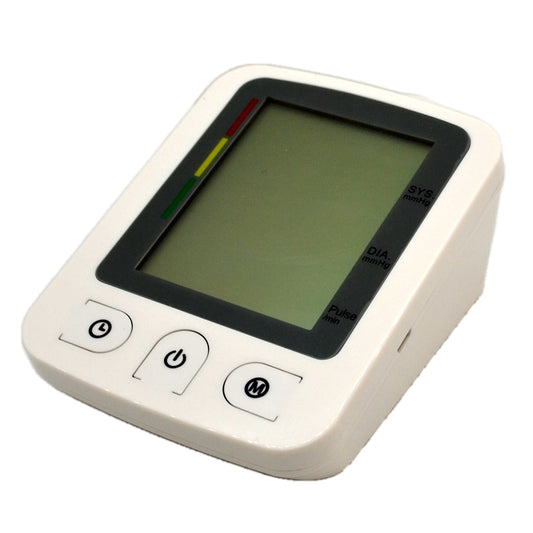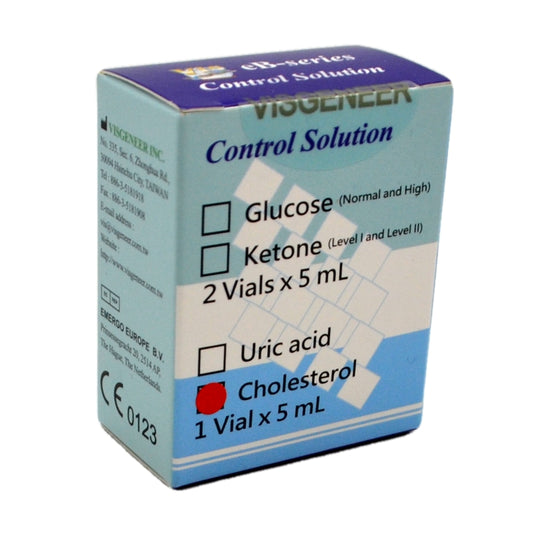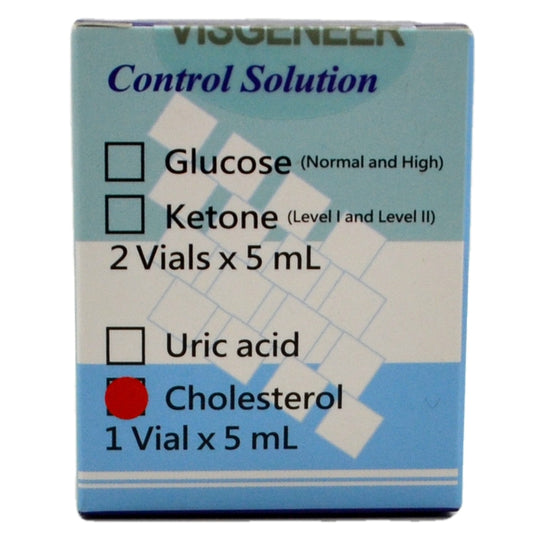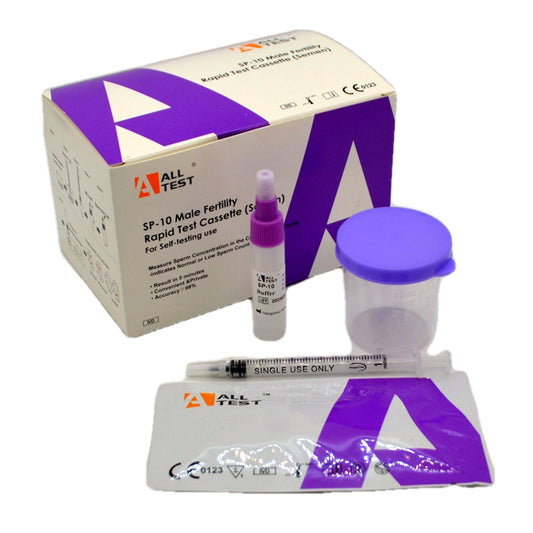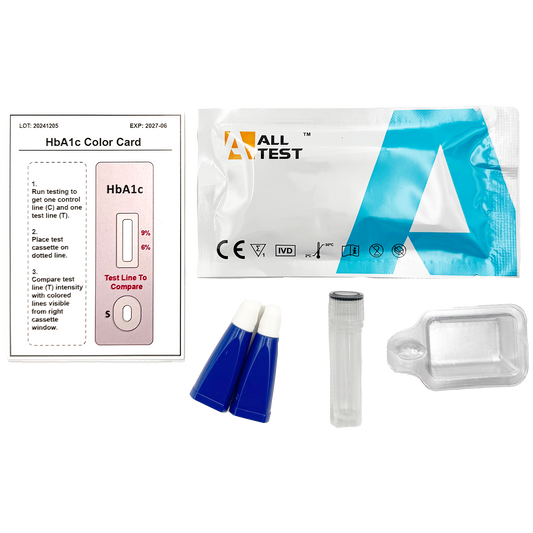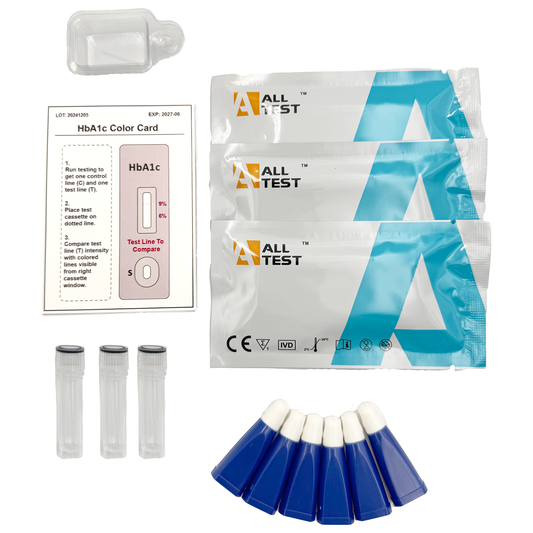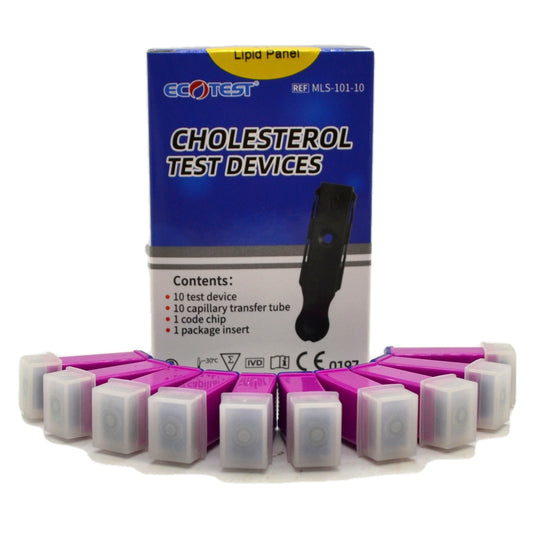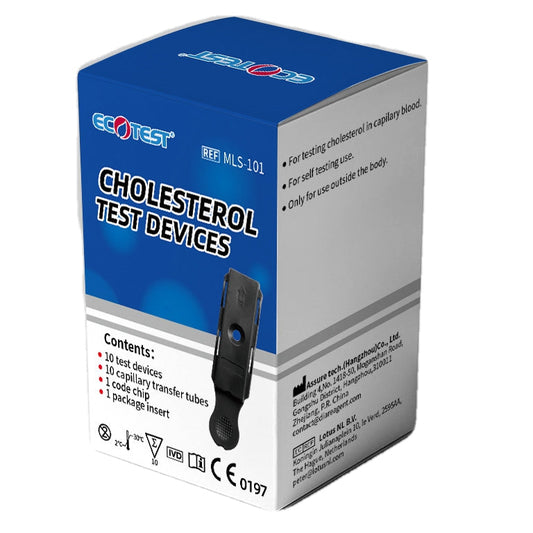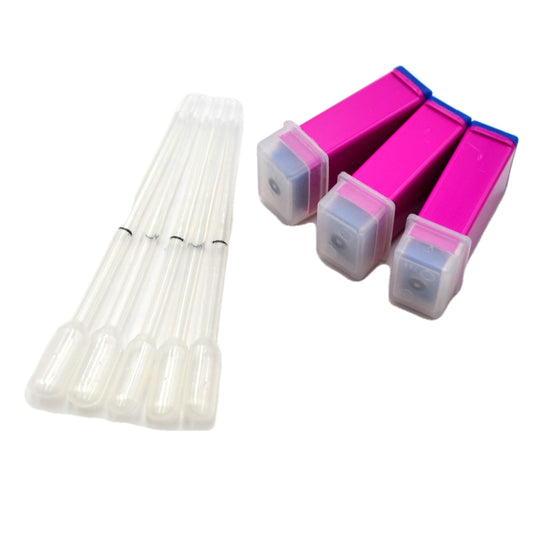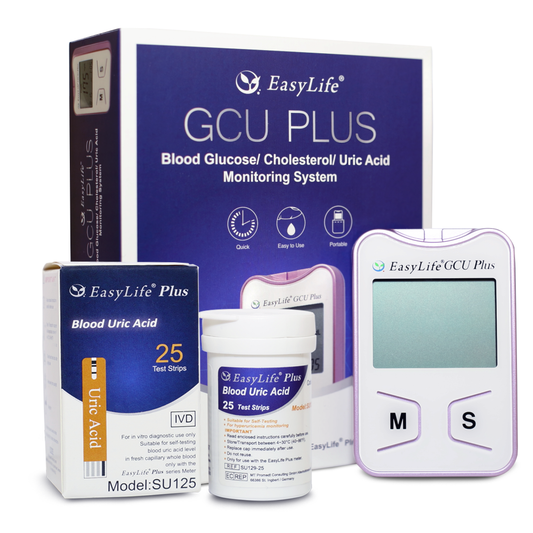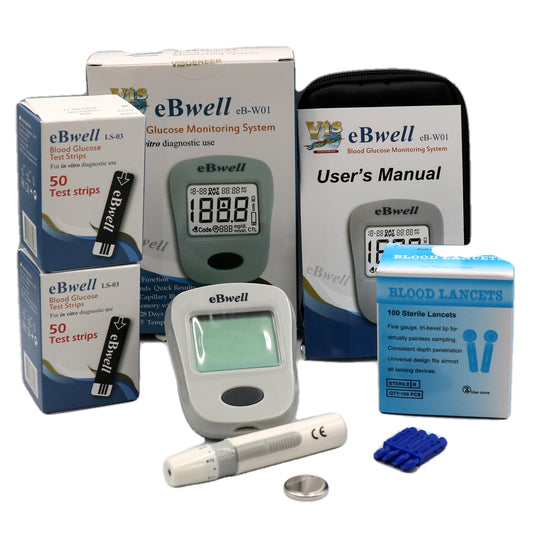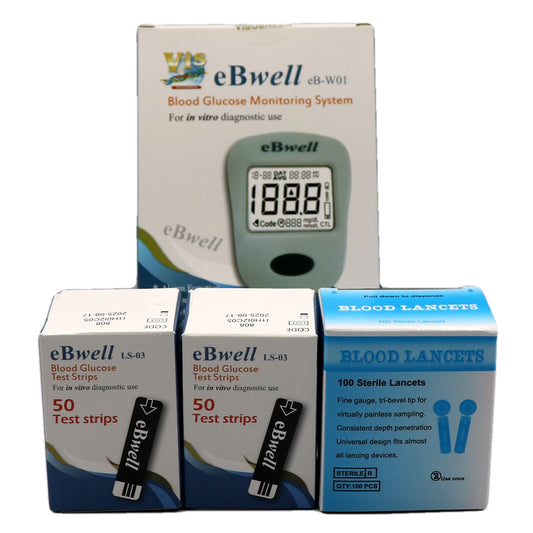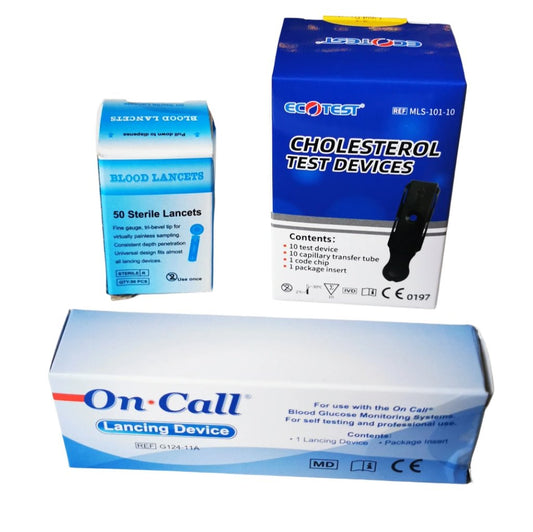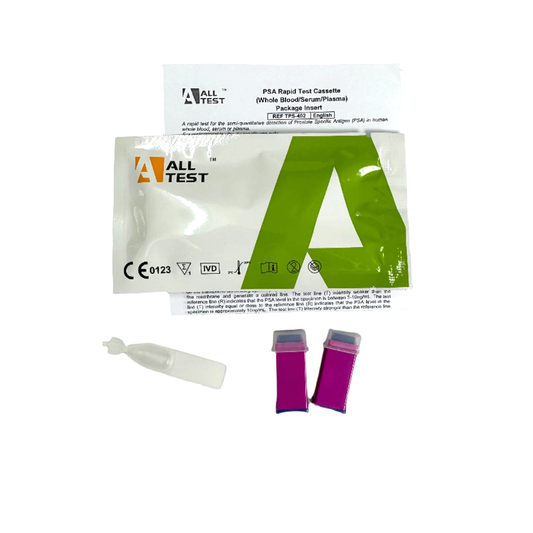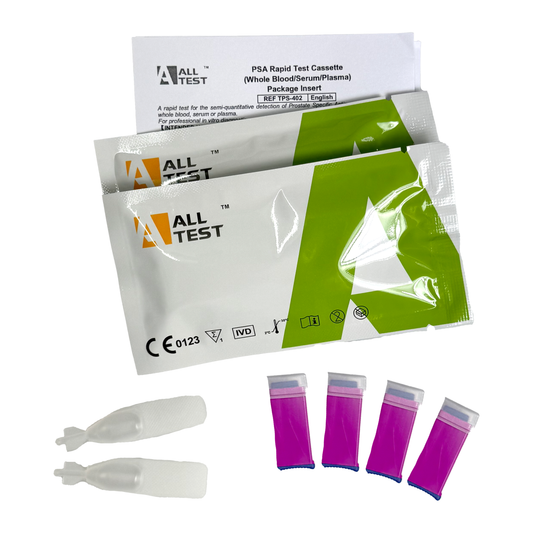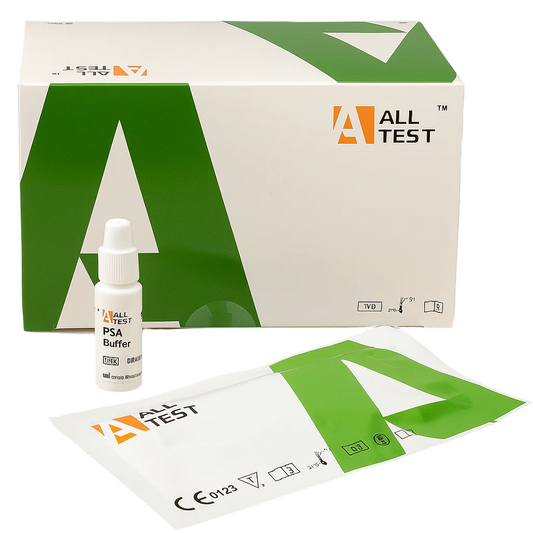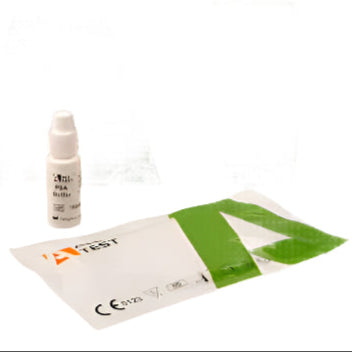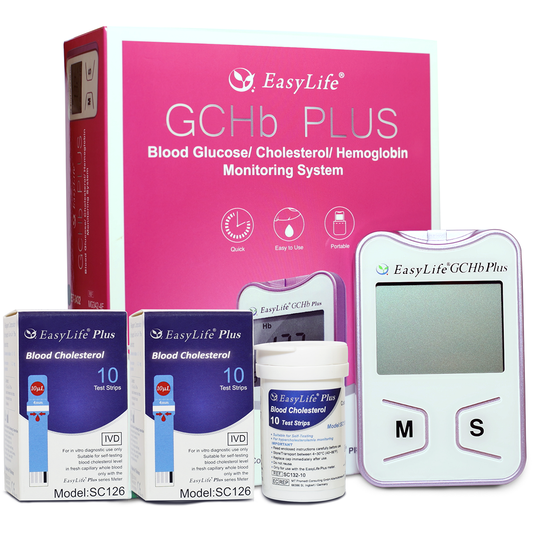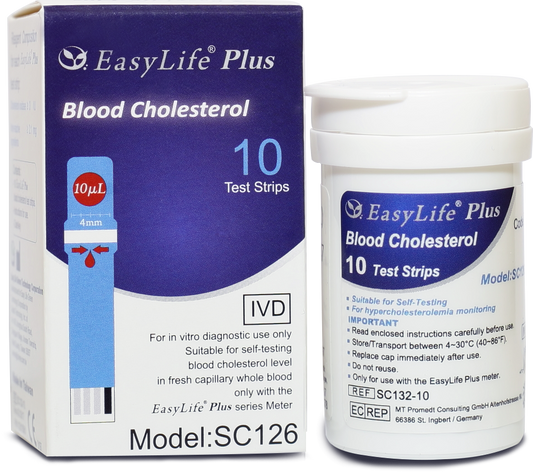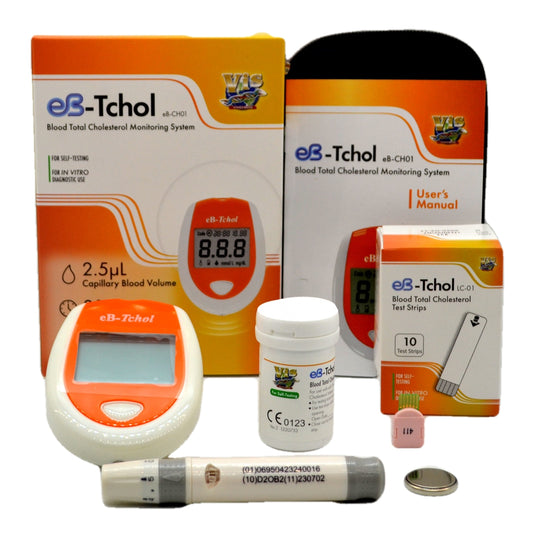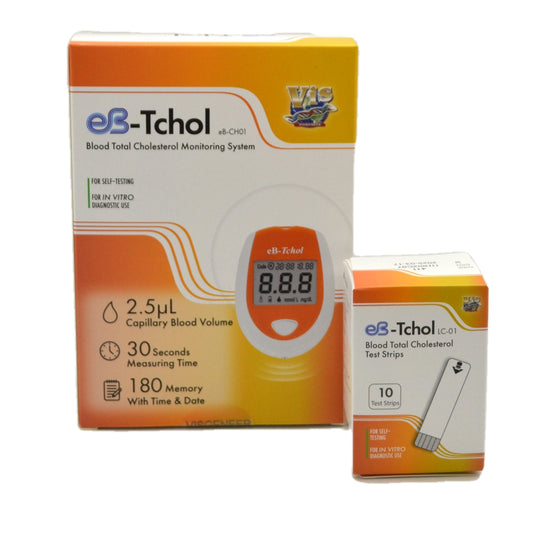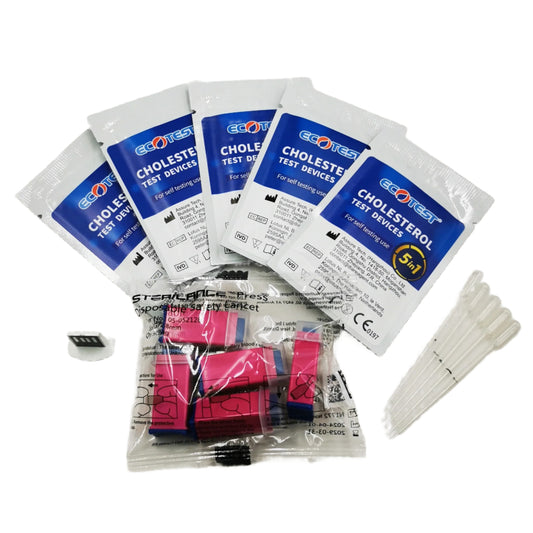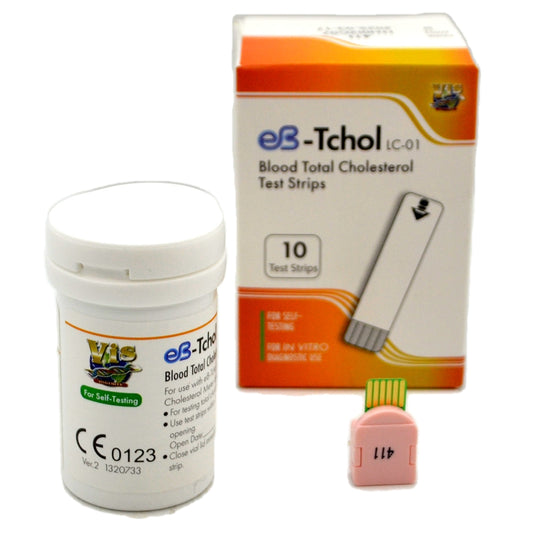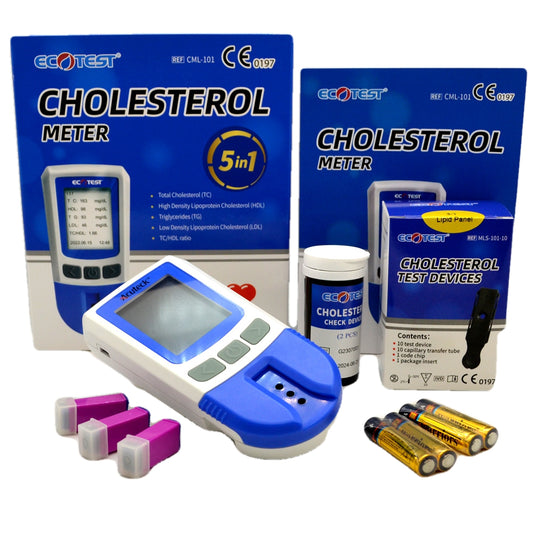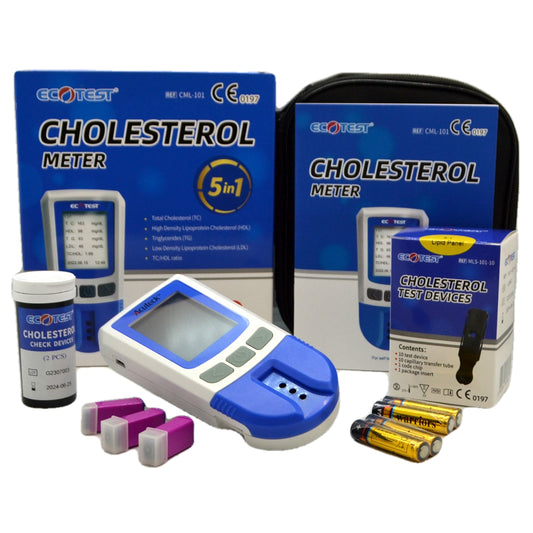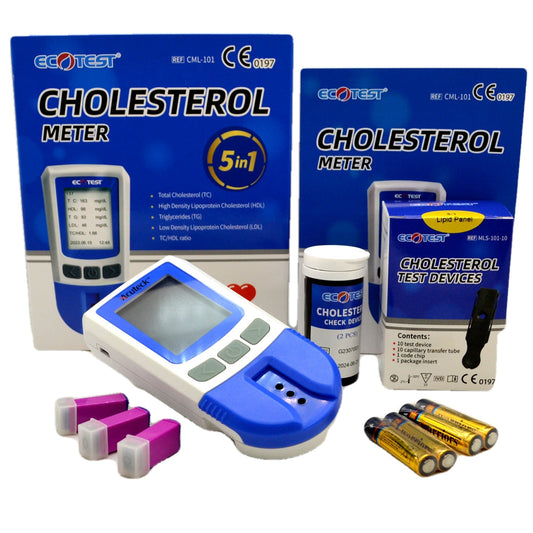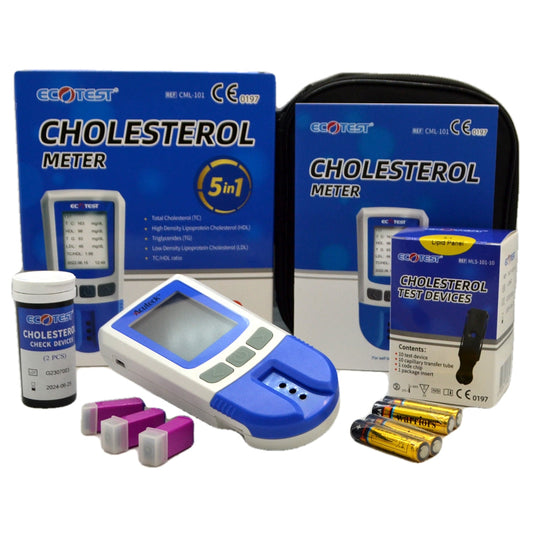Collection: Men's Health Tests
Health tests for men
A range of health screening home test kits, professional test kits and medical meters for home use, to monitor men's health quickly, accurately and easily. Any questions please check our FAQ at bottom of this page or contact our customer support team.
-
EASYLIFE Plus Blood Haemoglobin Anaemia Meter + 25 Easylife Plus Haemoglobin Test Strips + 25 Safety Lancets
4 reviewsRegular price £68.58 GBPRegular priceUnit price / per -
EASYLIFE GCU PLUS Blood Glucose / Total Cholesterol / Uric Acid Meter
6 reviewsRegular price From £49.99 GBPRegular priceUnit price / per -
ALLTEST 10 Parameter URS10 Urine Test Strips Pack of 100 test strips
12 reviewsRegular price £7.75 GBPRegular priceUnit price / per -
EASYLIFE GCHb PLUS Blood Glucose / Cholesterol / Haemoglobin Meter
5 reviewsRegular price From £49.99 GBPRegular priceUnit price / per -
ALLTEST Blood Haemoglobin & Haematocrit Meter
1 reviewRegular price £41.99 GBPRegular priceUnit price / per -
Fully Automatic Blood Pressure Monitor Kit JZIKI ZK-B869YA
3 reviewsRegular price From £19.99 GBPRegular priceUnit price / per -
HK-801 Automatic Blood Pressure Monitor
No reviewsRegular price £18.49 GBPRegular priceUnit price / per -
eB-Tchol Cholesterol Control Solution Pack
No reviewsRegular price £9.99 GBPRegular priceUnit price / per -
20 x AT 3 in 1 Cholesterol Test Devices for the AT Cholesterol 5 in 1 Meter
No reviewsRegular price £29.99 GBPRegular priceUnit price / per£69.99 GBPSale price £29.99 GBPSale -
ALLTEST SP10 Home Male Fertility Test Kit
2 reviewsRegular price From £7.99 GBPRegular priceUnit price / per -
ALLTEST Diabetes & Prediabetes Home Test Kit (HbA1c Glycosylated Haemoglobin)
No reviewsRegular price From £8.99 GBPRegular priceUnit price / per -
10 EcoTest Cholesterol Test Strips + Lancets + Pipettes (Ecotest cholesterol meter required to use these)
6 reviewsRegular price £39.99 GBPRegular priceUnit price / per£39.99 GBPSale price £39.99 GBP -
10 Spare Safety Lancets + Pipettes for use with EcoTest Cholesterol Test Devices
2 reviewsRegular price From £4.99 GBPRegular priceUnit price / per -
Easylife Plus Blood Uric Acid Meter + 25 Easylife Plus Uric Acid Test Strips + 25 Safety Lancets
4 reviewsRegular price £67.98 GBPRegular priceUnit price / per -
FREE eBwell Blood Glucose Diabetic Meter when you buy 100 blood glucose strips and 100 lancets
No reviewsRegular price £28.55 GBPRegular priceUnit price / per£43.50 GBPSale price £28.55 GBPSale -
10 EcoTest Cholesterol Test Devices + Pipettes + 50 lancets + Lancing Device
No reviewsRegular price £35.99 GBPRegular priceUnit price / per -
ALLTEST Mens Prostate Cancer Self Testing Kit (PSA)
1 reviewRegular price £5.95 GBPRegular priceUnit price / per£5.95 GBPSale price £5.95 GBP -
ALLTEST Professional PSA Test Cassettes Prostate Test Kits Pack Of 10
No reviewsRegular price £34.99 GBPRegular priceUnit price / per -
EASYLIFE Plus Total Home Cholesterol Testing Kit + 20 Cholesterol Tests
No reviewsRegular price £68.58 GBPRegular priceUnit price / per -
eB-Tchol Total Home Cholesterol Meter + 10 Cholesterol Tests
12 reviewsRegular price £39.99 GBPRegular priceUnit price / per -
5 EcoTest Cholesterol Test Devices Lancets + Pipettes Special Offer Expiry End September 2025 (Ecotest cholesterol meter required to use these)
No reviewsRegular price £5.99 GBPRegular priceUnit price / per -
eB-Tchol 10 Total Cholesterol Tests Refill Pack
8 reviewsRegular price From £18.99 GBPRegular priceUnit price / per -
EcoTest 5 in 1 Home Cholesterol Meter + 10 Home Cholesterol Tests
13 reviewsRegular price £142.95 GBPRegular priceUnit price / per -
EcoTest 5 in 1 Cholesterol Meter + 50 Cholesterol Test Devices
1 reviewRegular price £289.99 GBPRegular priceUnit price / per
Health tests for men
A range of health screening home test kits, professional test kits and medical meters for home use, to monitor men's health quickly, accurately and easily.
Health test kits for men including:
- Male fertility test kits to check sperm count and motility
- Professional PSA test kits to screen for prostate disease
- Uric acid meters
- Cholesterol meters
- Diabetes meters
- Haemoglobin meters
- Nitric acid test strips
- Automatic blood pressure monitors
Collapsible content
Can you do a urine test at home?
Yes, you can perform certain types of urine tests at home using over-the-counter kits. These kits are often designed to detect specific substances or conditions such as pregnancy, urinary tract infections, or drug use. They typically include instructions for collecting and testing the urine sample.
What are the causes of blood detected on a urine dipstick?
The presence of blood in urine, known as hematuria, can be detected on a urine dipstick and may be caused by various factors.
Here are some common reasons why blood might be detected on a urine dipstick:
- Urinary Tract Infection (UTI): Infections in the urinary tract, including the bladder or kidneys, can lead to inflammation and bleeding, causing blood to be present in the urine.
- Kidney stones: The presence of kidney stones can cause irritation and damage to the urinary tract, resulting in blood in the urine.
- Bladder or kidney Infections: Infections specifically affecting the bladder or kidneys can lead to hematuria.
- Trauma or injury: Physical trauma to the urinary tract, such as a recent injury or surgery, can cause bleeding.
- Inflammation of the genito or urinary tract: Conditions like cystitis, which involve inflammation of the bladder, can lead to blood in the urine.
- Prostate disease: In men, problems with the prostate can sometimes cause bleeding during urination.
- Certain medications: Some medications may cause irritation and result in blood in the urine.
- Inherited conditions: Certain inherited disorders can lead to blood in the urine.
- Menstruation: it is important to remember that in women menstruation can sometimes give a false positive for blood on a urine test strip, as the blood is not coming from the urinary tract but from menstruation.
It's important to note that the presence of blood on a urine dipstick is a preliminary indication, and further evaluation is necessary to determine the underlying cause, and rule out any serious underlying conditions. If you notice blood in your urine or if a dipstick test suggests its presence, it's crucial to consult with a healthcare professional. Additional diagnostic tests, such as a urine culture, imaging studies, or a cystoscopy, may be needed to identify the cause of hematuria and determine the appropriate course of action.
Why should I use a cholesterol test kit?
Cholesterol test kits offer convenience, allowing you to check your cholesterol levels at home without visiting your doctor or a healthcare facility. Regular monitoring is essential for individuals with a history of high cholesterol or those on cholesterol-lowering medications.
It's often recommended for regular monitoring of cholesterol levels, especially if you have a family history of heart disease or if you're managing your cholesterol through lifestyle changes or medications.
How do cholesterol test kits work?
A cholesterol test kit is a home diagnostic tool designed to measure the levels of cholesterol in your blood. It typically includes test strips, a lancet for blood collection, and a device (cholesterol meter) to analyse the blood sample.
These home cholesterol kits usually use a small blood sample, often obtained through a fingerstick. The blood is applied to a test strip, which. is then inserted into the meter which analyses the sample to provide blood cholesterol level readings.
Are home cholesterol tests accurate?
While home cholesterol test kits can provide reasonably accurate results, they may not be as precise as laboratory tests. Factors such as user error, sample collection, and test kit quality can influence accuracy.
How to interpret your cholesterol test results
Cholesterol Test Results
Some of the Cholesterol meters just displaty total cholesterol and some display 5 results for each completed blood test. Results are displayed in one of 2 scale options you can select, mmol/L or mg/dL. In the UK most cholesterol level results will be given in mmol/L.
Total Cholesterol
A normal Total Cholesterol level is below 5.0 mmol/L (200mg/dL) Above 5.0 but below 6.18 mmol/L is considered borderline elevated. Above 6.20mmol/L is considered high.
A high total cholesterol level can increase your risk of cardiovascular disease. However, decisions about when to treat high cholesterol are usually based upon the level of LDL or HDL cholesterol rather than the level of total cholesterol.
Total cholesterol levels can be tested at any time of day but the LDL and Triglyceride levels can vary depending on what has been recently eaten. For this reason, fasting (9-12hr) total cholesterol measurement is preferred by most doctors where either of the above two is elevated.
HDL
HDL or High-Density Lipoprotein is a good element and levels of over 1.55mmol/L (60mg/dL) are excellent. Levels between 1.00 mmol/L and 1.55 mmol/L are normal. Below 1.0 mmol/L are unhealthy. Men tend to have lower HDL levels than women 1 versus 1.2 mmol/L an ideal to aim for is 1.4 mmol/L
LDL
LDL or Low-Density Lipoprotein Cholesterol often referred to as bad cholesterol increases cardiovascular disease risk and Levels should be kept below 3.0 mmol/L
Triglycerides
High triglyceride levels are also associated with an increased risk of cardiovascular disease.
Triglyceride levels are assessed as follows:
●Normal – Less than 1.7 mmol/L (150 mg/dL)
●Mildly increased – 1.7 to 5.6 mmol/L (150 to 499 mg/dL)
●Moderately increased – 5.6 to 10 mmol/L (500 to 886 mg/dL)
●Very high – Greater than 10 mmol/L (886 mg/dL)
If your Cholesterol levels are abnormal we can not give personal or medical advice, so please discuss the findings with your Doctor, Nurse, or Pharmacist.
What are normal Uric Acid Levels?
Here are the normal blood ranges for Uric Acid.
Adult Males between 200 – 430 umol/L
Adult Females between 140 – 360 umol/L
Uric acid (urate) is produced during the breakdown of purines and excreted in both urine and faeces. Not everyone with elevated uric acid gets gout, only if crystals form in synovial joints.
Reasons to measure uric Acid
Uric acid can be elevated in pregnancy (uric acid may be measured while investigation/monitoring pre-eclampsia) during chemotherapy and radiotherapy. Uric Acid is also monitored in cases of renal failure and Liver disease resulting from excessive use of alcohol, starvation. Other rarer causes of high uric acid include a high-protein diet and strenuous exercise. Elevated levels are also seen in the rare inherited disorder, Lesch-Nyhan syndrome.
Low uric acid levels also occur in severe liver disease, low protein diet, heavy metal poisoning, Wilson's disease, and some cancers.
Some drugs will affect uric acid levels. These include, raised levels caused by thiazide diuretics, theophylline and low-dose aspirin;
Low blood Uric Acid levels can occur with high-dose aspirin, corticosteroids, and allopurinol.
What is a cholesterol test kit?
A cholesterol test kit is a home diagnostic tool designed to measure the levels of cholesterol in your blood. It typically includes test strips, a lancet for blood collection, and a device (cholesterol meter) to analyse the blood sample.
How do you use a sperm test kit?
Using a home sperm test kit typically involves the following general steps, but it's important to carefully follow the specific instructions provided with the test kit, as different brands of test may have variations in procedures:
- Read the Instructions: Start by thoroughly reading the instructions that come with the home sperm test kit. Each kit may have specific guidelines and recommendations.
- Collect the sample: Most kits require the collection of a semen sample. This is often done through masturbation into a clean, dry container provided in the kit. Some kits may offer alternative methods for sample collection.
- Prepare the sample: Follow the instructions for preparing the collected semen sample. This may involve allowing the sample to liquefy for a specified period.
- Apply the sample to the test device: Use the provided tools or applicators to transfer the semen sample onto the designated area of the test device. This area typically contains reactive components that interact with the sperm.
- Wait for the test results: Allow the recommended amount of time for the test to develop. The time may vary between different brands of test. Results can vary, but they are often indicated by the appearance or absence of lines on the test device.
- Read the results: Interpret the results according to the instructions provided. Typically, the presence or absence of lines will indicate the sperm count or fertility status.
- Note any Controls: Most tests include a control line C to confirm that the test has been performed correctly. Make sure to check for the presence of this control line.
- Follow-Up: Depending on the results, the test kit instructions may provide guidance on the next steps. If you have concerns about the results or if you are actively trying to conceive, consider consulting with a healthcare professional for further guidance.
What does a faint line on a the home sperm test kit mean?
If you are using an ALLTEST home sperm test kit with a cassette test device then a positive result is indicated by the presence of even a very faint test line. Conversely, a negative (Low) result is determined when a Control Line (marked as “C” on the device) is visible, but there is no Test Line (marked as “T” on the test device), indicating a sperm count below 15 million per milliliter.
Why wait 3 days before sperm test?
The recommended period of abstinence before conducting a semen analysis is typically advised to be between 2 to 5 days. If the period of abstinence from ejaculation is too short, this may give a low sperm count reading. Allowing an excessively long interval between ejaculates may lead to a significant decrease in sperm motility.
Can a home male fertility test kit be used to check a vasectomy has worked?
Home male fertility tests are not typically designed to assess the success of a vasectomy. These tests are more commonly focused on assessing sperm count, motility, and morphology to provide a general indication of male fertility.
To determine if a vasectomy has been successful, a post-vasectomy semen analysis is usually performed by a lab. This analysis is conducted by a healthcare professional, and it involves examining a semen sample to check for the presence of sperm. It is essential to follow the specific guidelines provided by the healthcare provider regarding when and how to provide the sample for accurate results.
If you've undergone a vasectomy and are concerned about its success or wish to confirm its effectiveness, it's crucial to consult with your healthcare provider. They will guide you on the appropriate testing procedures and provide accurate information based on your individual case. Home fertility tests are not suitable or accurate enough for assessing enough for assessing the success of a vasectomy.
Are home male fertility tests accurate?
Most home male fertility test kits have an accuracy rate of approximately 95-97%, when compared to the outcomes obtained through the standard laboratory-based semen analysis testing, but their accuracy can vary. Some home tests measure sperm count, motility, and morphology, providing an indication of male fertility.
It's important to note a few key points when it comes to home male fertility test kits:
- Accuracy: Home fertility tests can provide a general assessment, but they may not be as accurate as male fertility tests conducted in a clinical setting. The precision of these home tests can be influenced by factors such as user error, sample collection, and the specific methodologies employed.
- Limited information: Home male fertility tests typically provide limited information compared to a comprehensive semen analysis conducted in a laboratory. A full semen analysis can assess various parameters beyond just sperm count, including motility and morphology.
- Changes over time: Male fertility can vary, and a single home fertility test may not capture the full picture. If there are concerns about fertility, it's advisable to conduct multiple tests over a period and seek guidance from a healthcare provider if you have concerns about your fertility or you are having difficulties conceiving.
Can your wife or partner help with obtaining the sperm sample?
When a man is providing a semen specimen for analysis, a spouse or partner may assist with the collection. It's important to note that lubricants or saliva should not be used.
What are the rules before sperm test?
Before undergoing a sperm test, also known as a semen analysis, individuals are typically advised to follow certain guidelines to ensure accurate and reliable results. While specific instructions may vary depending on the healthcare provider or laboratory, here are some general rules often recommended before a sperm test:
- Abstain from ejaculation: It's commonly recommended to abstain from ejaculation for a certain period before the sperm test, usually between 2 to 5 days. This abstinence helps in obtaining a representative sample for analysis.
- Avoid certain substances: Individuals are often advised to refrain from alcohol, tobacco, and recreational drugs in the days leading up to the test, as these substances can potentially affect sperm quality.
- Minimize stress: Stress can impact reproductive health, so it's advisable to try to minimise stress levels before the test.
- Maintain regular diet and exercise: A healthy lifestyle, including a balanced diet and regular exercise, can positively influence overall health, including reproductive health.
- Follow specific instructions: Patients should carefully follow any specific instructions provided by their doctor, fertility clinic or laboratory. This may include details about the collection process, storage, and transport of the sample.
- Inform about medications: If the individual is taking any medications or supplements, it's essential to inform the healthcare provider, as certain medications can affect sperm parameters.
What time of day is sperm count highest?
Sperm count can vary throughout the day, and there isn't a universal "best" time for everyone. However, many studies suggest that sperm counts tend to be higher in the early morning. This may be due to hormonal variations that influence sperm production.
In studies, semen samples collected between 5:00 am and 7:30 am from healthy individuals demonstrated a statistically significant increase in sperm concentration, total sperm count, and the percentage of normally shaped sperm compared to samples collected later in the day. The time of sample production did not impact sperm motility.
Keep in mind that individual factors, lifestyle, and health conditions can also play a role in sperm count.
Can sperm analysis be wrong?
The way the semen for the sperm analysis is collected and processed can play a major factor in the results. Time is of the essence; sperm cells start to die after about an hour, and their motility decreases.A too-cool or too-warm sample may also yield a false verdict of sub-standard sperm.
Are there any medical conditions which would prevent me getting accurate cholesterol results?
Yes there are a few medical conditions and drug supplements that can interfere with your cholesterol test results.
Please consider the following if you are not getting consistent or accurate readings with your cholesterol meter:
- High dose Vitamin C. Ascorbic Acid supplements, often as part of multivitamins or taken on their own will interfere with results. If they are not prescribed and it is possible to stop taking Vitamin C in high dose, cholesterol testing can be resumed after 7 days.
- High Bilirubin levels in the blood will interfere with cholesterol test results. The level may be below that required to cause clinical jaundice. Raised bilirubin levels in the blood can occur in many medical conditions including anaemia, cirrhosis, following a blood transfusion, Gilbert syndrome—a common, inherited condition in which there is a deficiency of an enzyme that helps break down bilirubin, viral hepatitis, gall bladder disease, as a reaction to drugs (including statins) and in alcoholic liver disease.
- High urate levels can result from renal disease and early kidney failure but can also be caused by many other things including dehydration, diuretics (water retention relievers), drinking too much alcohol, drinking too much soda or eating too much of foods that contain fructose, a type of sugar, high blood pressure (hypertension), Immune-suppressing drugs, Leukemia.
- Haemolysis, the breakdown of large numbers of blood cells. Routinely follows a blood transfusion, but can also occur after trauma, surgery, and in a range of blood and bone marrow diseases.
With the exception of Vitamin C and prescribed drugs, most of the above will require medical investigation to confirm the underlying cause, but is worth considering if the cholesterol meter check device test is normal and the lancing technique, sample collection, and procedure are all correct. Please just don't blame the meter, or ignore the results, the problem may in fact be you! It could be something that you are taking or that you have an underlying medical condition that you may be completely unaware of!

